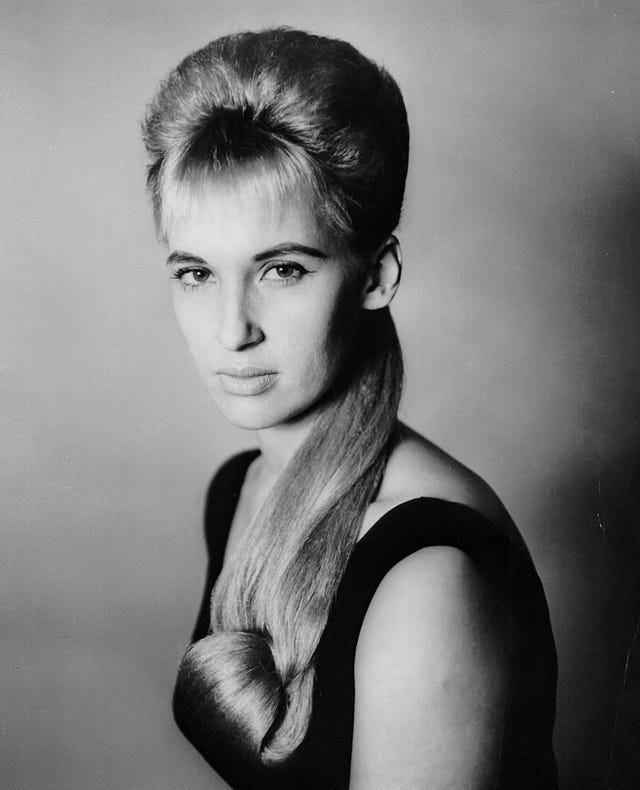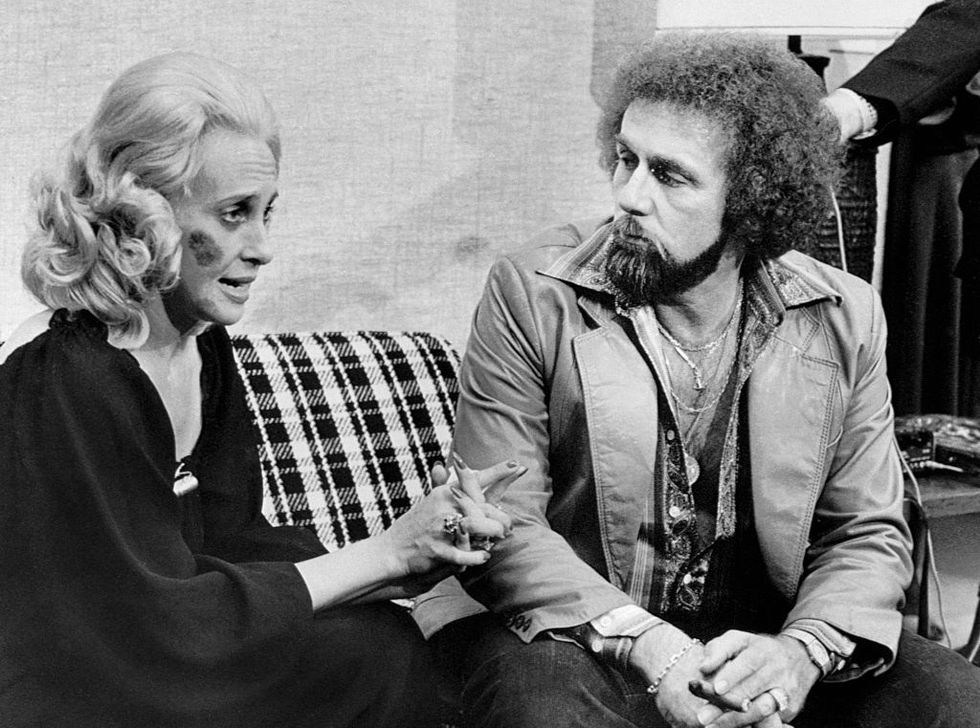Tammy Wynette, the country star known for her song "Stand By Your Man" and her achingly vulnerable singing voice, also possessed a toughness and determination. As the subject of the upcoming drama miniseries George & Tammy, her resilience helped her endure a lifetime of heartbreak and drama.
Wynette reached the top of the country music world but her personal life brought terrible low points. The "First Lady of Country Music" had five husbands, including fellow country legend George Jones, and health problems that led to a decades-long addiction to painkillers and contributed to her early death at age 55.
"No other female country singer conveyed the emotion of heartbreak like Tammy Wynette," states a website dedicated to the singer. "She endeared herself to millions by singing about topics of everyday life – divorce, loneliness, parenting, passion. Her tearful singing style was the voice of every heartbreak a woman has ever known. Perhaps it's that Tammy herself lived through such tumultuous times that she could convey the emotion of such weighty topics."
Tammy Wynette was born Virginia Wynette Pugh in 1942 in rural Itawamba County, Mississippi. Her father died when she was very young, and her mother remarried, leaving her to be raised by her grandparents. At age 7, she began working long days picking cotton with her family, a lesson in hard work she never forgot. Even after Wynette found fame as a singer, she kept a crystal bowl full of cotton in her home to remind herself of those days in the cotton field.
Wynette married Euple Byrd in 1960 at age 18. A construction worker, Byrd had trouble keeping a job so the couple moved from place to place. But Wynette never shied away from hard work and held a variety of jobs, including as a waitress, shoe-factory employee, cocktail waitress, and hair stylist before making her name in country music. In fact, the practical Wynette renewed her cosmetology license every year until her death, just in case she ever had to go back to earning a living as a beautician.
Wynette had two daughters with Byrd by the time she was 20—Gwendolyn and Jacquelyn—and then left him while she was pregnant with their third daughter, Tina, who developed spinal meningitis not long after her birth. By now living in Alabama, Wynette worked as a hairdresser after getting up at 4 a.m. every morning to sing on the "Country Boy Eddie" TV show for a local station.
In 1966, Wynette and her daughters moved to Nashville so she could try to land a recording contract. Given her lack of experience in the music business, the move was a very risky decision, especially with three little girls dependent on her, but Wynette eventually signed a deal with Epic Records and took the stage name "Tammy Wynette." She married songwriter Don Chapel in 1967.
With Epic's backing, Wynette's risk-taking paid off. As Rolling Stone put it, "She came out of the gate with a barrage of successful singles, beginning with Johnny Paycheck's 'Apartment #9' in 1967 and peaking with her 1969 number-one hit, 'Stand By Your Man.'"
The year 1969 was a huge one for Wynette. She released her Greatest Hits, Volume 1, which became the first album by a female country singer to be certified gold by the Recording Industry Association of America, according to Rolling Stone. Wynette also joined the Grand Ole Opry, cementing her country-star status. And she married fellow country star George Jones, beginning a long singing collaboration that continued even after the couple parted ways. Their duets included the No. 1 country hits "Near You" and "Golden Ring." Wynette and Jones had a daughter, Tamala Georgette, the year after they married. Unfortunately, their stormy relationship and Jones' well-documented alcoholism led to their divorce in 1975.
Wynette married two more times, first to businessman Michael Tomlin in 1977 (they split after only 44 days), then, in 1978, to singer-songwriter George Richey, who served as her manager in the 1980s. The union, which lasted until her death in 1998, was an abusive one, according to Wynette's daughter Georgette.
Shortly after they married, Wynette claimed she had been the victim of a kidnapping attempt, and even had a large bruise on her face to prove it. Yet, decades later, Georgette Jones wrote in her memoir The Three of Us: Growing Up With Tammy and George that she believed the story was a coverup designed to the truth that Richey had beaten Wynette.
Georgette wrote that Richey "tried very hard to separate mom from her family and friends so he could be the only person she could turn to. I think she felt like she had no choice and it was too difficult to fight."
Wynette suffered from a variety of health problems for much of her life, including chronic intestinal pain, and underwent multiple surgeries. But she always managed to work through the pain, with an increasing dependence on painkillers, unfortunately. Georgette Jones believed Richey, by encouraging Wynette's use of drugs, was indirectly responsible for her death.
"There are some people who witnessed mom saying she didn't want any pain medication, to not give her anymore and Richey would continue to inject her anyway," Georgette wrote in her 2011 book, according to the Boot. "There were times when she did want it because she was in pain and he refused to give it to her. She did admit to my sister that when all that stuff came out about her being kidnapped in 1978 that she and Richey had had a fight and he had beaten her. He threatened to destroy her life and write a tell-all book so she decided to stay with him."
Wynette's band and back-up singers became used to covering for her in her later years when she went on stage impaired. "The band even had a saying to clue one another in that Tammy was seriously under the influence: 'Virginia's in the house.' Virginia Pugh was Tammy's real name, and when Virginia's name was invoked, it indicated an overmedicated Wynette," according to the 2010 biography Tammy Wynette: Tragic Country Queen by Jimmy McDonough.
Wynette died in her sleep at her home in Nashville in 1998. The cause of death was reported as a blood clot in her lungs. She was just 55.
"We found out so many things after my mom died," wrote Georgette. "It's painful to think that my mom lived the kind of life she lived and we didn't understand some of it."
In all, Wynette racked up more than 20 No. 1 hits, several of which she co-wrote, and 11 of her albums went to No. 1. She won two Grammys, for "I Don't Wanna Play House" and "Stand By Your Man" and three Country Music Association "Female Vocalist of the Year" awards.
Later in 1998, Wynette was inducted into the Country Music Hall of Fame.
"Assertively working-class and womanly, Wynette expressed the difficulties facing working women: raising children, holding down a job, and performing domestic roles," the Country Music Hall of Fame said of Wynette. "Her 'steel magnolia' image allowed her to work within a male-dominated environment in which prejudices against women were still strong. If she has been the victim, she has also been the survivor.



















